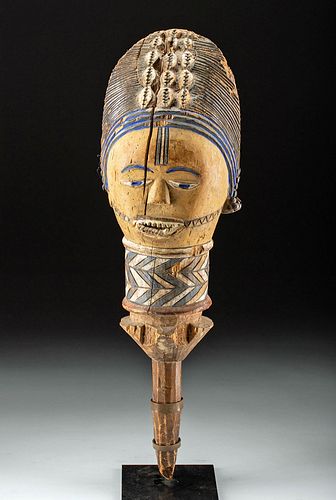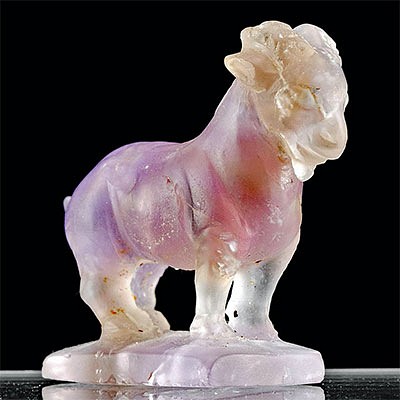Early 20th C. African Kuyu Wood Head Finial, ex Bonhams
Lot 116c
About Seller
Artemis Gallery
686 S Taylor Ave, Ste 106
Louisville, CO 80027
United States
Selling antiquities, ancient and ethnographic art online since 1993, Artemis Gallery specializes in Classical Antiquities (Egyptian, Greek, Roman, Near Eastern), Asian, Pre-Columbian, African / Tribal / Oceanographic art. Our extensive inventory includes pottery, stone, metal, wood, glass and textil...Read more
Categories
Estimate:
$1,800 - $2,700
Absentee vs Live bid
Two ways to bid:
- Leave a max absentee bid and the platform will bid on your behalf up to your maximum bid during the live auction.
- Bid live during the auction and your bids will be submitted real-time to the auctioneer.
Bid Increments
| Price | Bid Increment |
|---|---|
| $0 | $25 |
| $300 | $50 |
| $1,000 | $100 |
| $2,000 | $250 |
| $5,000 | $500 |
| $10,000 | $1,000 |
| $20,000 | $2,500 |
| $50,000 | $5,000 |
| $100,000 | $10,000 |
| $200,000 | $20,000 |
About Auction
By Artemis Gallery
Dec 2, 2021
Set Reminder
2021-12-02 10:00:00
2021-12-02 10:00:00
America/New_York
Bidsquare
Bidsquare : Fine Antiquities | Asian | Ethnographic Art
https://www.bidsquare.com/auctions/artemis-gallery/fine-antiquities-asian-ethnographic-art-7918
Features classical antiquities, ancient and ethnographic art from cultures encompassing the globe. Egyptian, Greek, Roman, Etruscan, Near Eastern, Asian, Pre-Columbian, Native American, African / Tribal, Oceanic, Spanish Colonial, Russian, Fine / Visual Arts, so much more! Artemis Gallery info@artemisgallery.com
Features classical antiquities, ancient and ethnographic art from cultures encompassing the globe. Egyptian, Greek, Roman, Etruscan, Near Eastern, Asian, Pre-Columbian, Native American, African / Tribal, Oceanic, Spanish Colonial, Russian, Fine / Visual Arts, so much more! Artemis Gallery info@artemisgallery.com
- Lot Description
Central Africa, Democratic Republic of the Congo, near Brazzaville, Kuyu peoples, ca. early 20th century CE. An intriguing head finial carved from wood and exhibiting an expressive countenance atop a slender handle. The highly stylized, yellow-painted face features downcast eyes with blue pupils beneath arching brows, a bulbous nose, rows of ritually sharpened teeth flanked with bands of inversely corresponding triangular scarifications, and parallel bars engraved on the forehead. One ear and both temples are decorated with dozens of applied brass tacks indicative of jewelry, and the neckline is layered with blue and white diagonal bars. The tall, elaborate coiffure features three columns of carved cowrie snail shells indicative of wealth, and dozens of feather slots are still visible along the verso. The tapered handle doubles as a pole mount when the head is carried high in the air during the penultimate initiation ceremonies of the secret Ottote male society. Size: 7" W x 23.5" H (17.8 cm x 59.7 cm); 24.125" H (61.3 cm) on included custom stand.
According to African art expert Jean-Baptiste Bacquart, "Living in the Republic of Congo, the Kuyu people are divided into two clans whose totemic animals are the snake and the panther. They achieve cohesion through a secret male society called Ottote. Kuyu artists carved light wood figures, known as Okue, who carry an emblematic animal on their heads. Very little is known about their function, but they are thought to be used during Ottote ceremonies. Kuyu carvers also produced wooden heads with rounded features and complex or conical coiffures. These heads were inset with feathers and carried on top of long poles during ceremonies at the end of the Ottote initiation period." (Bacquart, Jean-Baptiste. "The Tribal Arts of Africa: Surveying Africa's Artistic Geography." Thames & Hudson, New York, 2000, p. 117)
Cf. Bacquart, Jean-Baptiste. "The Tribal Arts of Africa: Surveying Africa's Artistic Geography." Thames & Hudson, New York, 2000, p. 117, fig 14 and p. 119, fig. C.
Provenance: private New York, New York, USA collection; ex-Bonhams Auction Nov 9, 2011 Lot #382 where it brought $2500 and sold to Mary Sue and Dr Paul Peter Rosen, who have collected African art for over thirty years, making nine trips to Africa to study the art in its cultural setting. The Rosens have published three African art books, curated more than ten exhibitions from their collection, and have given public lectures about African art and culture. They have donated art from their collection to various institutions including the Newark Museum, Temple University in Philadelphia, the SMA Fathers African Art Museum in Tenafly, New Jersey, and the African American Research Library in Fort Lauderdale, Florida.
All items legal to buy/sell under U.S. Statute covering cultural patrimony Code 2600, CHAPTER 14, and are guaranteed to be as described or your money back.
A Certificate of Authenticity will accompany all winning bids.
PLEASE NOTE: Due to recent increases of shipments being seized by Australian & German customs (even for items with pre-UNESCO provenance), we will no longer ship most antiquities and ancient Chinese art to Australia & Germany. For categories of items that are acceptable to ship to Australia or Germany, please contact us directly or work with your local customs brokerage firm.
Display stands not described as included/custom in the item description are for photography purposes only and will not be included with the item upon shipping.
#159278Losses to right ear as well as areas of lower conical base and tip of handle as shown. Original feathers missing from slots on verso. Chips and abrasions to handle, neckline, face, and coiffure, with a few stable fissures across face and neck, fading to some painted areas, and inactive insect damage. Great remains of pigment and figurative details throughout.Condition
- Shipping Info
-
All shipping is handled in-house for your convenience. Your invoice from Artemis Gallery will include shipping calculation instructions. If in doubt, please inquire BEFORE bidding for estimated shipping costs for individual items.
-
- Buyer's Premium



 EUR
EUR CAD
CAD AUD
AUD GBP
GBP MXN
MXN HKD
HKD CNY
CNY MYR
MYR SEK
SEK SGD
SGD CHF
CHF THB
THB













